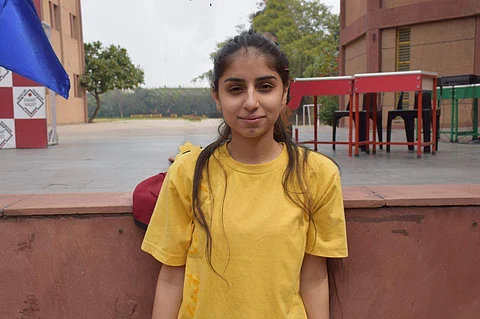

On her way to school every day, Anahit Bindra would notice children from slums playing on the roads. These children usually wouldn’t have much clothes on. Deciding to help them out, Anahit took a bunch of her old clothes to the slum and distributed it among the children. “They were so happy after receiving the clothes which didn’t seem like that big a contribution to me. That’s when I realised how much they were in need of something as basic as clothing,” she says. And she decided to help out the people in any way she can. She contacted her aunt, who works in the garment industry, and arranged to help some women from these slums. “Some of my aunt’s tailors were from the Khayala community in West Delhi. So, I decided to help out the women there,” Anahit says. And Sew the Divide was born!
It all began in December when Anahit would visit the slums to talk to the women. “In India, the major problems are unemployment and poverty and if these two are addressed a lot of problems can be solved. Most of the women there had basic sewing skills and usually did it as a pastime. So, sewing was a skill that could generate employment and earn them some money,” says Anahit. After receiving initial funding from her parents for buying sewing machines and collecting fabric from export houses and warehouses through her aunt’s contacts, she asked the women to stitch kurtas. “In January, we did workshops with these women in the slums. My aunt’s tailors were involved in this process,” she says. Later, Anahit purchased five sewing machines - three of which have been placed in a store in the slums where a group of 12 women work.
Soon, she also started her fundraiser on Milaap with a goal to raise Rs 1.5 lakh, of which she has already raised over Rs 1.3 lakh. “I plan to buy more sewing machines for these women and expand the operations to include more women from other areas of Delhi,” Anahit says. However, the lockdown has halted her expansion plans. “While I have been in touch with the 12 women, I have been unable to source the fabric and ensure that it reaches them. They haven’t been able to work over the last few months,” says the 16-year-old, who attends Vasant Valley School in Delhi. Anahit hopes that when she goes back the women would still be willing to continue the work. However, the women did stitch some masks during the pandemic.
Anahit supplies the clothes that these women make to NGOs like Goonj, Dream Girl Foundation and Clothes Box Foundation. “Each of the women earn Rs 250 by selling a kurta and Rs 75 for a mask,” she says. “When the lockdown restrictions were eased, I received photos from people at Clothes Box Foundation who had gone to Uttarakhand to distribute clothes made by the women.” Anahit says. Ultimately, Anahit aims to make these women self-reliant. “They shouldn’t stop working when I go off to college next year. I want to provide them with the resources and connect them to the market or channels to distribute. My role as a middlewoman, as a supplier, should become redundant after a while,” Anahit explains.
Speaking about how she balances her initiative with school, Anahit says, “There really isn’t much to do. After supplying them with the fabric, I just have to contact the NGOs to collect it when the clothes are made. It really doesn’t come in the way of my studies.”
